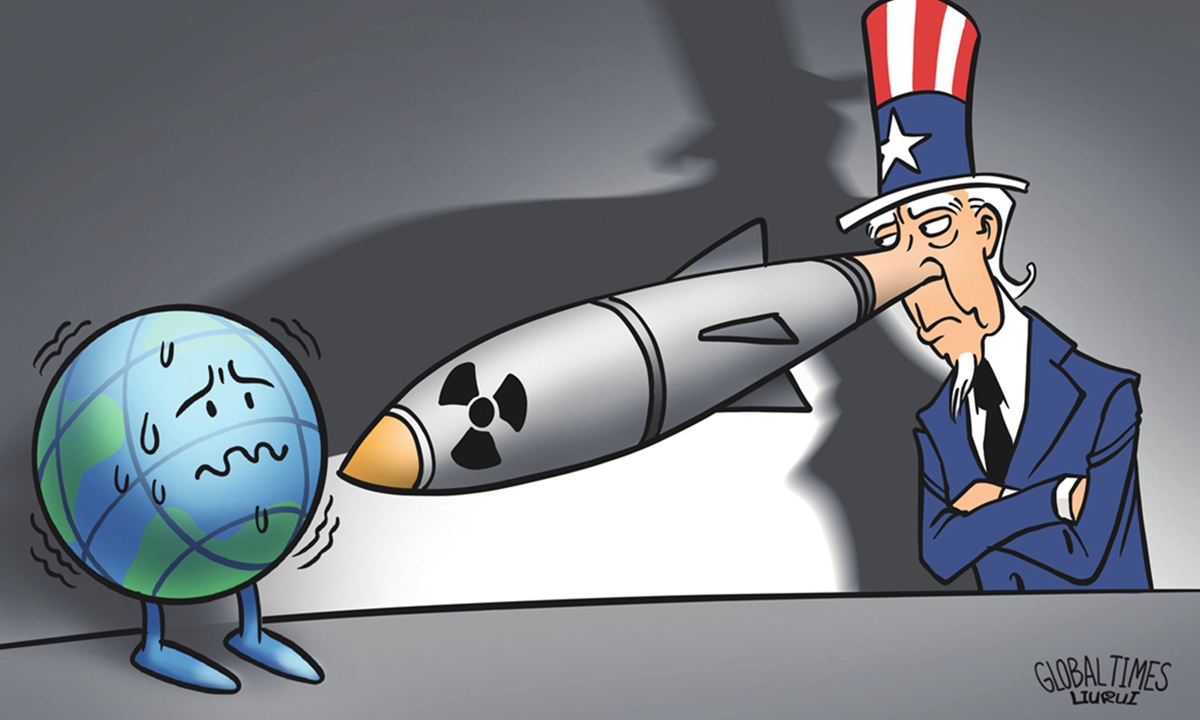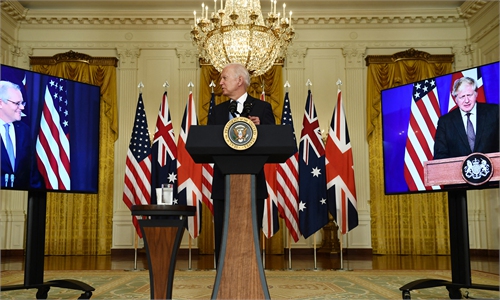When it comes to nuclear war, there is no pill for regret: Global Times editorial

US nuclear power Illustration: Liu Rui/GT
Is the "spectre of a nuclear war" looming? With the escalation of the Russia-Ukraine conflict, the international community has a growing sense of crisis over a possible outbreak of a nuclear war. Russian President Vladimir Putin recently noted that high-level officials from NATO had threatened to use nuclear weapons against Russia. Russia possesses "lots of weapons to reply," Putin said, while stressing that this is not a bluff. In addition, at the Tenth Review Conference of the Parties to the Treaty on the Non-Proliferation of Nuclear Weapons, UN Secretary-General Antonio Guterres warned that we are facing "a time of nuclear danger not seen since the height of the Cold War."
Nuclear weapons are the most lethal weapons. If an incontrollable nuclear war breaks out, it will bring human society into the abyss of destruction. A recently released study shows that a full-scale nuclear war between the US and Russia would lead to deaths of more than 5 billion people worldwide.
Now, a dangerous signal is emerging: Whether or not the parties are venting anger or talking big, the frequency of discussions on nuclear weapons is increasing. But nuclear weapons are by no means a grenade that can be tied up on the waist, and taken out to show off at one's whim to scare people. The spiral escalation of war is often unpredictable. On the issue of nuclear war, there is no pill for regret.
Therefore, it is imperative for relevant parties to cool down the situation as soon as possible and create conditions for promoting peace talks. It should be noted that the current "nuclear tension" stems from a strong sense of insecurity in geopolitical games. An important reason is that the possibility of conflict between major powers is on the rise, and global strategic stability is being swayed rapidly. And a simple truth is that the more peaceful and stable the environment is, the thicker the dust will be on nuclear weapons. But once the world is caught in the vicious circle of "seeking greater security - becoming less secure - wishing more for absolute security," nuclear weapons will be likely taken out and polished.
To make matters worse, the nuclear non-proliferation system is more fragile than ever. In this regard, the US and the West should bear the main responsibility. Over the years, the "nuclear double standards" of the US and the West have been like a needle, which pricks on the global nuclear non-proliferation efforts, forming loopholes one after another, resulting in lower nuclear threshold and a predicament in which it is difficult to prevent nuclear proliferation.
In addition, the US, driven by the Cold War mindset, has strengthened bloc politics and military alliances, sought absolute strategic advantage, provoked confrontation between camps in both ends of the Eurasian continent, and promoted the forward deployment of nuclear missile and other strategic forces. The series of negative moves is the crux of the "nuclear tension."
Today, Washington is the most active player in the international arena in expressing "concerns" about nuclear war. We believe that if Washington means what it says, as a nuclear power and the world's only superpower, it should do more by taking concrete actions to alleviate the sense of insecurity in the international community, especially among the major powers.
For instance, it can stop developing and deploying global anti-missile systems, stop seeking to deploy ground-based intermediate-range missile systems overseas, withdrawing nuclear weapons deployed abroad as soon as possible, and refraining from replicating "nuclear sharing" arrangements in any form in the Asia-Pacific region, etc. Only if the US does these first will it be in a position to issue demands on others.
The US and Russia, which possess the largest nuclear arsenals, should effectively fulfill their special and preferential historical responsibility for nuclear disarmament and further reduce their respective nuclear arsenals significantly and substantially in a verifiable, irreversible and legally binding manner, so as to create conditions for the eventual achievement of all-out and complete nuclear disarmament. Furthermore, we call on the nuclear-weapon states to abandon their nuclear deterrence strategies that focus on pre-emptive strikes. As is well known, China is the only one among the five nuclear-weapon states to have pledged to "no first use" of nuclear weapons. It will not use or threaten to use nuclear weapons against non-nuclear-weapon states or nuclear-weapon-free zones. It plays an extremely important role in reducing nuclear risks and preventing nuclear conflicts. We hope other nuclear-weapon states, especially the nuclear powers, could follow China's lead.
Earlier this year, the leaders of the five nuclear-weapon states, including China, Russia, the US, the UK and France, issued the Joint Statement of the Leaders of the Five Nuclear-Weapon States on Preventing Nuclear War and Avoiding Arms Races, affirming that "a nuclear war cannot be won and must never be fought." The prevention of nuclear war is fundamental to maintaining global strategic stability and ensuring undiminished security for all. Only in this way can the nuclear weapons at hand "serve defense purposes, deter aggression, and prevent war," and create a safe environment more conducive to promoting disarmament and ultimately building a world free of nuclear weapons.

